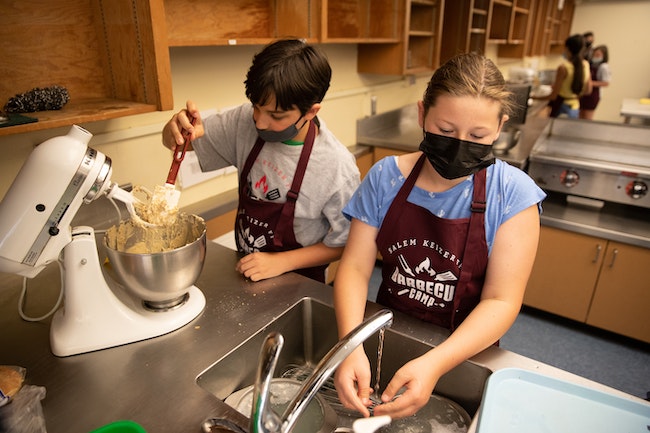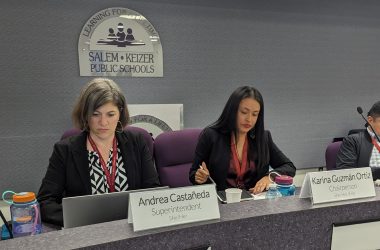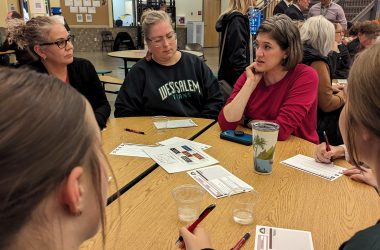 Salvador Luna, 13, scrapes batter off of a mixer as Stella Pedersen, 12, washes her hands while the two work on a cast-iron dessert during the Farm to Fork enrichment camp at McNary High School on Wednesday, July 14. (Amanda Loman/Salem Reporter)
Salvador Luna, 13, scrapes batter off of a mixer as Stella Pedersen, 12, washes her hands while the two work on a cast-iron dessert during the Farm to Fork enrichment camp at McNary High School on Wednesday, July 14. (Amanda Loman/Salem Reporter)
A line of kettle grills smoked outside McNary High School on a recent Wednesday morning, casting a haze over the parking lot.
Inside the school kitchen, students bustled, mixing dough and sprinkling cookie crumbs into cast iron skillets.
It was the third day of camp for about 25 students participating in a master course on barbecue, covering everything from cutting a proper New York strip to making salsa from scratch using peppers grown on campus.
Salvador Luna, 13, said he hoped to improve his cooking skills, which he’d been working on during the pandemic as a way to ease the burden on his parents.
“I figured if I’m stuck at home, might as well help around the house,” he said of his dinner duties.
The two-week camp is one of dozens being offered at Salem area schools this summer thanks to a multimillion dollar boost in state funding. Students pay nothing to attend and, in many cases, go home with supplies so they can enjoy their new hobbies.
Oregon legislators passed a $250 million spending package to pay for expanded summer and child care programs at schools and community centers across the state. They hoped the money would help kids who struggled academically and socially after over a year of online school.
The Salem-Keizer School District received almost $13 million to run summer programs for kids from kindergarten through high school, with additional money for child care.
In a normal year, Salem-Keizer spends about $1.5 million on summer school.
“It’s significantly more resources than we normally have,” said Suzanne West, the district’s director of strategic initiatives. “We’re trying to utilize all the resources we have to prepare kids for fall and give them a summer they’ll remember.”
The camp at McNary is called Farm to Fork. It’s taught by Gerald Hosler, McKay High School agriculture instructor, and culinary instructor Chris Feskens, who have put on a similar program for several years. But this year, the teachers decided to put a fresh spin on it: barbecue.
Feskens said when they asked students, “What’s barbecue to you?” replies focused on hamburgers and hot dogs. One of their goals for the two-week program is to show kids there’s much more to be grilled, from vegetables and fruits to sauces.
Sessions have 25 middle school students each who work in groups. For their final project, the students will prepare a meal from scratch with a main dish, sauce, side and dessert, all cooked on the grill. Some of the ingredients they’re using are grown by agriculture students at McKay in the school’s greenhouse.
With extra state money, Feskens and Hosler can have more students in each session and pay high school students to help assist.
They also bought a rotisserie grill, which roasted a pineapple during a recent class as students worked on desserts. At the end of the program, students will take home their own small kettle grill and various supplies, including a meat thermometer.
Hosler described the package as “nicer stuff than I have at home.”
More than 5,200 district students have enrolled in “enrichment” summer programs like Farm to Fork targeted at elementary and middle school students.
Programs run all summer and include camps where students build wooden benches, make botanical art, become expert dungeon masters, or study French.
Though students are learning skills, those programs don’t have to have an academic component or translate to school credits. Instead, the goal is to get kids excited about being back in school and around their peers.
Pamella Eiter, who’s teaching a robotics summer camp, said that flexibility has been a big help. Eiter teaches at Stephens Middle School and normally runs a robotics camp with her husband Kent, a third-grade teacher.
Because no credit has to be earned, Eiter doesn’t have to spend a few hours at camp teaching reading or math. In the past, such requirements have deterred kids from signing up, she said.
“They didn’t want to feel like they’re going to summer school,” she said.
This summer, her students spend more time learning through hands-on activities.
 Tato Ferris, 13, works on a design during the Robotics Wiz Camp enrichment camp at CTEC on Wednesday, July 14. (Amanda Loman/Salem Reporter)
Tato Ferris, 13, works on a design during the Robotics Wiz Camp enrichment camp at CTEC on Wednesday, July 14. (Amanda Loman/Salem Reporter)
Early in the camp, Eiter had students design a small cart and held a competition to see which group’s invention would travel the furthest down a short track and across the concrete floor of a classroom at the Career Technical Education Center, where camp is held.
After an initial contest, students spent the following morning tweaking their designs and doing more trial runs, cheering as cars whizzed past lines on the floor.
“The heavier it is, the faster it goes is what we’re seeing,” said Tato Ferriss, an eighth grader at Waldo, who was working with Jai Kolavennu, an eighth grader at Crossler, to add another heavy wheel to the front of their cart.
Students in the class said they were eager to receive the Lego robotics kits they’d be working with – items that served as a draw for many to sign up.
“I just really like Legos,” said Mason Arnold, a sixth grader at Howard Street Charter School.
He and Nicholas Simpson, a sixth grader at Straub, worked to reformat their car.
While many students said it was nice to be around classmates again after spending most of the school year online, few described that as their main motivation for attending camp. Instead, they were simply eager to build robots.
“I just thought that it’d be really fun,” Simpson said.
Contact reporter Rachel Alexander: [email protected] or 503-575-1241.
JUST THE FACTS, FOR SALEM – We report on your community with care and depth, fairness and accuracy. Get local news that matters to you. Subscribe to Salem Reporter starting at $5 a month. Click I want to subscribe!

Rachel Alexander is Salem Reporter’s managing editor. She joined Salem Reporter when it was founded in 2018 and covers city news, education, nonprofits and a little bit of everything else. She’s been a journalist in Oregon and Washington for a decade. Outside of work, she’s a skater and board member with Salem’s Cherry City Roller Derby and can often be found with her nose buried in a book.









